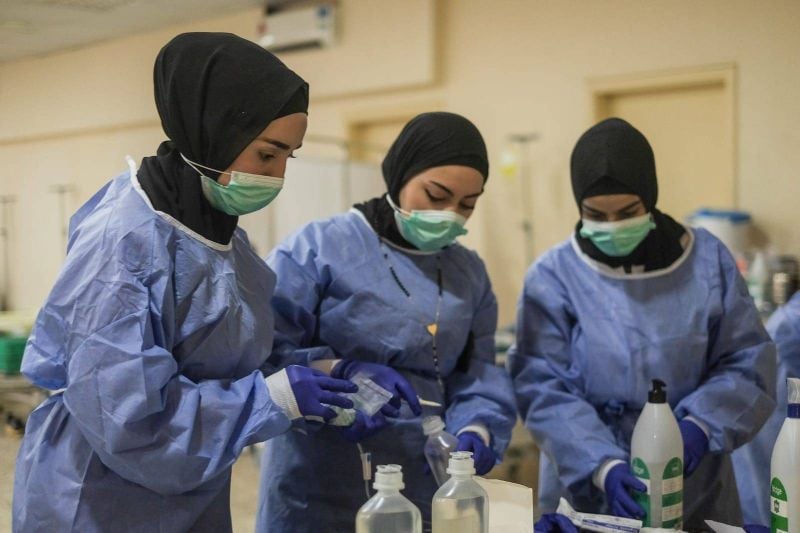
Healthcare workers at a cholera ward in Bebnine, Akkar governorate, Oct. 25, 2022. (João Sousa/L'Orient Today)
Lebanon is passing through one of the most severe and complex crises in its recent history. The coalescence of political turbulence, financial meltdown, continued refugee influx, and the lingering COVID-19 pandemic has gravely strained the healthcare system. This has been compounded by a brain drain, particularly of highly skilled workers. More than 20 percent of nurses and 40 percent of doctors have left Lebanon.
Access to healthcare services has become difficult as the costs of care continue to soar, particularly with the decreased purchasing power and increased reliance on imported medical products. As a result, health outcomes and indicators such as life expectancy, maternal mortality and childhood vaccination rates have worsened. Forgotten diseases such as diphtheria, tetanus and, most recently, cholera have re-emerged as the health gains of previous years fade away.
A massive mismatch between the health needs of the population and the available resources has emerged. The overall Public Health Ministry budget shrunk from $486 million in 2018 to less than $37 million in 2022. In this context, estimates on total healthcare spending show a reduction of more than 40 percent. However, the bill has risen sharply for patients: As the majority of the population falls below the poverty line, out-of-pocket payments on healthcare have risen sharply to reach almost half of the bill.
Foreign aid has become increasingly integral to the sustainability of basic health service provision. However, international crises, rising world inflation, donor fatigue and conflicting international political agendas have choked the already insufficient stream of aid. The decision by many donors to work directly through NGOs rather than public institutions, the presence of a multitude of uncoordinated and occasionally competing aid platforms and a fragmented healthcare system have resulted in less impactful aid initiatives at a time when the resources are increasingly scarce.
It was therefore imperative to develop a unifying National Health Strategy that sets the direction and highlights Lebanon’s priorities. MOPH, in consultation with all national and international stakeholders, has led the process of writing down the strategy toward a more equitable, integrated and efficient health system that ensures universal access to value-based and people-centered quality care. This strategy will help align the international support offered to Lebanon, as it becomes the base for a better-coordinated response to acute health needs while simultaneously building a stronger, self-sufficient and more responsive system.
The National Health Strategy focuses on several issues:
• Enhancing the governance of the health sector and institutionalizing evidence-informed policy and decision-making. There is a need for a health financing strategy that will be the basis for reforming the fragmentation caused by the multitudes of health funds and leading to sustainable health financing away from donor dependency.
• Positioning primary healthcare as the cornerstone for the delivery of quality basic services while ensuring financial protection, and serving as a gateway to secondary and tertiary care as well as a spectrum of public health interventions. Investment in primary health care is expected to generate savings that can be reinvested and pave the way to decreased dependency on aid. The roadmap to strengthening primary healthcare necessitates redefining the role of the MOPH, reviewing the benefits packages and revisiting the financing schemes.
• Investing in public health system strengthening and emergency preparedness is imperative to ensuring system resilience and adaptability. This necessitates investment in essential infrastructure such as a reference laboratory to check water quality, food quality and bacteria, an emergency operating center and a network of antimicrobial surveillance facilities.
• Identifying the shortage in healthcare workers as the biggest challenge to the health system and addressing the root causes of the healthcare workforce drain, by improving the working conditions at healthcare facilities and developing a healthcare workforce recovery roadmap with short, medium- and long-term perspectives.
• Highlighting digital transformation as a fundamental intervention to enhance transparency and accountability and contribute to regaining trust in public institutions. This also facilitates tracking of medications and thus combats harmful practices, and will allow monitoring of health outcomes. A national health information system master plan that can focus efforts under a shared directive is fundamental.
Despite the hardships, Lebanon realizes that in the crisis lies an opportunity. We expect that implementing the National Health Strategy will result in individuals living healthier lives and enjoying access to quality care regardless of financial hardships. Healthcare providers will work in a system that addresses the key determinants of health and responds to health emergencies. Public institutions will work toward universal health coverage and be trusted to work for the public interest. Investment in health contributes to human development and economic growth and thus has gains beyond healthcare. Although these might be far-fetched goals, the journey of thousand miles begins with a single step.
Firass Abiad has been Lebanon's Public Health Minister since 2021.

